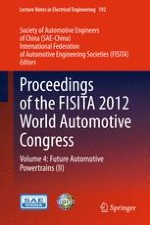2013 | OriginalPaper | Chapter
Future Commercial Vehicle Powertrains: Contributions to Sustainable Transportation
Authors : Heimo Schreier, Lukas Walter
Published in: Proceedings of the FISITA 2012 World Automotive Congress
Publisher: Springer Berlin Heidelberg
Activate our intelligent search to find suitable subject content or patents.
Select sections of text to find matching patents with Artificial Intelligence. powered by
Select sections of text to find additional relevant content using AI-assisted search. powered by
